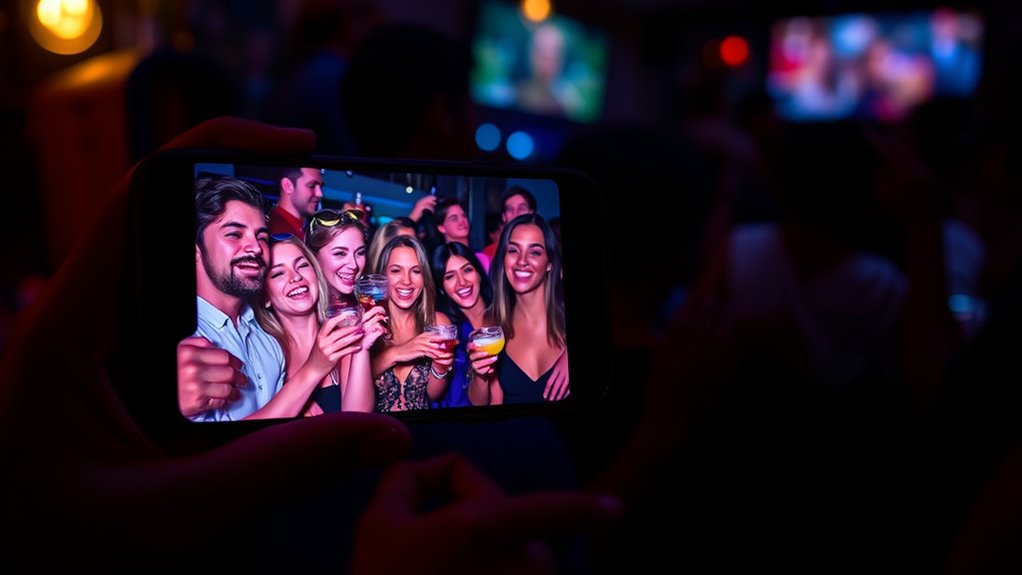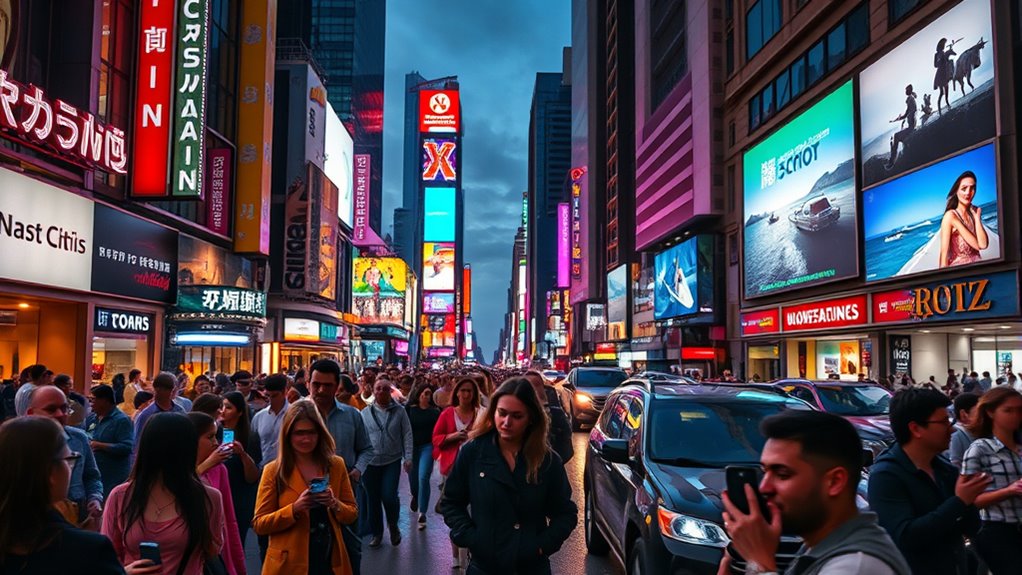FOMO, or the fear of missing out, is a modern anxiety where you feel uneasy when you see others enjoying experiences you’re not part of. Social media plays a big role, exposing you to curated highlights that make your own life seem less exciting. It’s driven by social comparisons, need for validation, and societal pressures. If you want to understand more about how FOMO affects you and ways to manage it, stay tuned for helpful insights.
Key Takeaways
- FOMO stands for “Fear of Missing Out,” a modern anxiety about missing rewarding experiences others enjoy.
- It involves feelings of envy, insecurity, and the need to stay connected to avoid missing events.
- Social media amplifies FOMO by showcasing curated highlights of others’ lives and experiences.
- FOMO triggers behaviors like constant phone checking, impulsive decision-making, and social comparisons.
- Overcoming FOMO involves mindfulness, limiting social media use, and focusing on present moments.
Defining FOMO: The Modern Anxiety

Have you ever felt uneasy watching others enjoy experiences you’re not part of? That’s FOMO—fear of missing out—a modern anxiety fueled by celebrity culture and social comparisons. When friends post about glamorous events or exclusive parties, it’s easy to feel left out. You might wonder why you weren’t invited or worry you’re missing something important. This sense of envy and insecurity pushes you to stay connected, constantly checking for updates. FOMO isn’t just about missing a party; it’s about feeling anxious that your life isn’t as exciting or validated as others’. It’s a reflection of how social media, celebrity culture, and constant notifications create a pressure to be everywhere and do everything, fueling this persistent fear of missing out.
The Role of Social Media in FOMO

How does social media amplify our fears of missing out? It constantly exposes you to viral trends and exciting events happening around the world. Seeing friends post about parties, trips, or achievements creates a sense that you’re missing something important. This fuels digital peer pressure, making you feel compelled to stay connected and participate. Social media’s curated content often shows only the highlights, making your experiences seem less exciting in comparison. As a result, you might feel anxious or left out when you’re not involved. The rapid spread of viral trends makes it easy to believe everyone else is having a better time than you. This relentless stream of updates keeps FOMO alive, convincing you that missing out is inevitable if you’re not always online. Additionally, understanding email marketing strategies can help you manage your online presence more effectively, reducing the anxiety associated with social comparison.
Psychological Factors Behind FOMO

Your tendency to compare yourself with others fuels FOMO, making you feel like you’re missing out on better experiences. This social comparison can heighten your fear of missing out, especially when you see others enjoying things you aren’t part of. Understanding these psychological factors helps you recognize why FOMO impacts you so deeply. Engaging in self-care routines such as using eye patches can also help improve your overall well-being and reduce feelings of inadequacy.
Social Comparison Dynamics
Social comparison plays a pivotal role in fueling FOMO by constantly measuring your experiences against others’. When you see friends or peers sharing exciting events, you may feel peer pressure to keep up or participate. This comparison can lead you to believe others are having better experiences, triggering feelings of inadequacy or exclusion. Social validation becomes important as you seek approval through likes, comments, or recognition of your activities. If your life doesn’t match the idealized images others present, you might think you’re missing out. This cycle of comparing and seeking validation intensifies FOMO, making you more anxious about not being part of what’s happening. Ultimately, social comparison sharpens your awareness of what you lack, fueling the fear of missing out. Recognizing the emotional distance that can develop from these comparisons can help you foster healthier perspectives and reduce feelings of exclusion.
Fear of Missing Out
What psychological factors drive the intense fear of missing out? Peer pressure plays a big role, making you feel compelled to participate in events others are enjoying. Decision fatigue also contributes, as constant choices wear you down, leading to anxiety about missing better opportunities. This combination pushes you to stay connected and act quickly, fearing you’ll regret not joining in. To better understand, consider this table:
| Factor | How It Affects FOMO | Example |
|---|---|---|
| Peer Pressure | Creates social obligation, urging participation | Attending a party despite feeling tired |
| Decision Fatigue | Reduces ability to weigh options calmly | Choosing quickly to avoid missing out |
| Anxiety | Fuels urgency and worry about missing out | Checking notifications repeatedly |
Additionally, the psychological factors behind FOMO can be reinforced by social media, which amplifies exposure to others’ enjoyable experiences, increasing your fear of missing out.
Recognizing the Signs of FOMO

FOMO often reveals itself through specific behaviors and feelings that can alert you to its presence. You might notice you’re constantly checking your phone or social media, feeling anxious when you’re not part of an event or experience. Peer pressure can push you to join activities just to avoid feeling left out, even if you’re unsure about them. Decision fatigue also plays a role; after making many choices throughout the day, you may feel overwhelmed and *enthusiastic* to say yes to every invitation to avoid missing out. You might experience restlessness or a persistent worry that you’re missing something better elsewhere. Recognizing these signs helps you understand when FOMO is influencing your actions, so you can address it consciously instead of reacting impulsively. Being aware of remote work productivity and managing your environment can also help reduce feelings of FOMO by creating a more satisfying and balanced daily routine.
Strategies to Overcome FOMO

Once you’ve recognized the signs of FOMO, you can start taking practical steps to reduce its influence. Practicing mindfulness helps you stay present and appreciate what you have, rather than constantly comparing yourself to others. Engage in mindfulness practices like deep breathing, meditation, or journaling to ground yourself in the moment. Additionally, consider a digital detox by limiting your social media use or setting specific times to check updates. Taking breaks from digital platforms helps reduce the constant exposure to curated highlights, easing feelings of missing out. Understanding zodiac compatibility can also offer reassurance by highlighting that relationships and personal traits are complex and multifaceted. These strategies encourage healthier habits, foster self-awareness, and promote contentment, making it easier to resist the pull of FOMO and focus on your own journey.
The Impact of FOMO on Well-Being

Have you ever noticed how constant feelings of missing out can drain your energy and affect your mental health? FOMO can lead to increased stress, anxiety, and even depression, making it harder to enjoy the present. When you constantly compare yourself to others or feel left out, your mental well-being takes a hit. This persistent worry can also push you toward unhealthy lifestyle changes, like overusing social media or neglecting self-care. Recognizing FOMO’s impact is vital for maintaining balance. By setting boundaries and focusing on meaningful activities, you can protect your mental health and foster a more positive outlook. Addressing FOMO helps you regain control, reduce stress, and create a healthier lifestyle overall. Incorporating mindfulness practices can help reduce emotional reactivity and improve your overall mental resilience.
Frequently Asked Questions
Can FOMO Affect People of All Ages Equally?
FOMO can affect people of all ages, but how you experience it depends on your susceptibility to peer pressure and social comparison. Younger individuals might feel it more due to social media’s constant updates, but adults aren’t immune. You might compare yourself to others or feel pressured by peer groups, leading to anxiety or regret. Recognizing these feelings helps you manage FOMO, regardless of your age, and focus on what truly matters.
How Does FOMO Influence Decision-Making in Daily Life?
FOMO can completely hijack your decision-making, making you feel like missing out is an emergency. You might give in to peer pressure or constantly compare yourself to others, thinking their lives are perfect. This urge to keep up can lead you to make impulsive choices, like attending events you don’t want, just to avoid regret. Ultimately, FOMO pushes you to prioritize fleeting excitement over your true happiness and goals.
Is FOMO Linked to Specific Mental Health Disorders?
FOMO can be linked to mental health disorders like social anxiety and obsessive behaviors. When you experience FOMO, it may heighten your social anxiety, making you fear missing out on social events or connections. This can lead to obsessive behaviors, such as constantly checking social media or overcommitting to activities. Recognizing these links helps you understand how FOMO impacts your mental health and encourages healthier decision-making and coping strategies.
Can FOMO Lead to Long-Term Psychological Effects?
FOMO can lead to long-term psychological effects like increased social anxiety and decreased self-esteem. When you constantly worry about missing out, you may become more anxious in social situations, feeling less confident about yourself. Over time, this persistent fear can erode your self-esteem and make you avoid social interactions altogether. Addressing these feelings early helps prevent FOMO from negatively impacting your mental health over the long term.
Are There Cultural Differences in Experiencing FOMO?
You’ll find that cultural differences shape how you experience FOMO. In collectivist cultures, about 60% of people report feeling more FOMO due to social media, as community and group activities matter more. Conversely, individualist cultures tend to emphasize personal achievement over social comparison. So, your cultural background influences how intensely you feel FOMO, especially when social media highlights social events, making you more susceptible based on cultural norms.
Conclusion
FOMO is like a shadow lurking behind every scroll and ping, whispering that you’re missing out on life’s brightest moments. It pulls you into a whirlwind of doubt and envy, clouding your happiness. But remember, you hold the power to turn off that shadow’s voice. Embrace your own journey, cherish what you have, and let your peace be the lighthouse guiding you away from the storm of endless worry. Your true happiness shines within.









